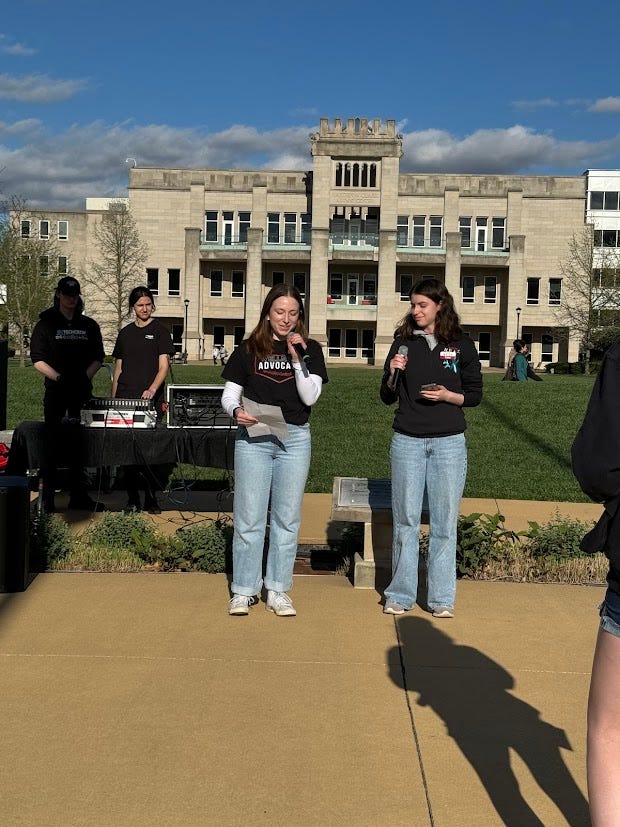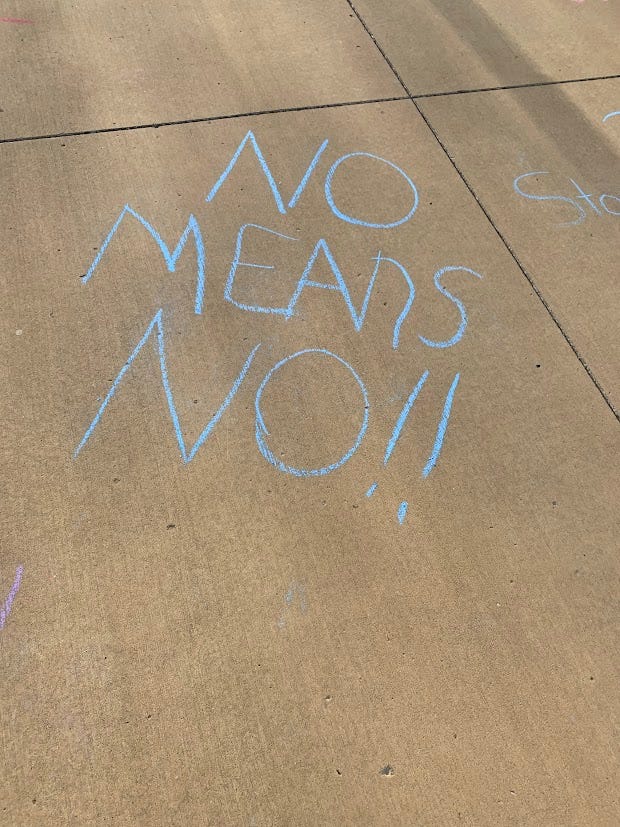Take Back the Night March at Bradley University
She Speaks hosted its second Take Back the Night March to support and provide resources to survivors.
She Speaks hosted the Take Back the Night March on April 17. This event was filled with resources for those affected by sex and gender-based violence, along with safety tips and support.
At Bradley University the march was for the eight cases of rape, six cases of fondling, 10 cases of stalking and one report of domestic violence that were reported on campus this year.
Take Back the Night March is the oldest worldwide movement against sexual violence dating back to 1972 at the University of Southern Florida for resources and safety for women on campus. Throughout the rest of the 1970s protests happened in San Francisco, Philadelphia and Belgium to advocate for the safety of women.
In the 1980s colleges and universities in North America began holding marches and rallies on campus. Bradley’s campus started their participation in the movement in 2014. This year marked the second march hosted by She Speaks, the first one being Spring of 2023.
The goal of this march was to raise awareness of the statistics and show support to those who survived whether it was reported or not.
Similar to last year’s march, speakers from different organizations shared ways to be safe, how to show support, and where people can get help on campus.
History of Take Back the Night March.
In the 1990s the marches started to create change. Survivors started to share their stories, the events became more active with clanging pots and pans and candlelight vigils. During this time policies, laws, and handbooks were changed to ensure victims’ rights and a consent-based definition of sexual violence.
In the 2000s more people started to join the marches such as male and other gender-identifying survivors, corporations and professional sports teams along with their employees.
In 2010 the march expanded to 2-year colleges and underserved communities. During this time free 24/7 legal support started to become available. Today 24/7 services are still available.
What Take Back the Night March looked like this year.
She Speaks founder and President Zoie Roach-king has planned the event for two years. Roach-king found it important to have due to her own experiences and showing support by being someone ready to speak up.
“I personally experienced it, not here on campus but in high school and in the Peoria area, so I felt like as a club and a student who isn’t afraid to speak up, I felt like it this was a place where people can feel safe and I wanted to do something that made students feel and share their experiences.”
She chose speakers who she knew would be beneficial to hear from, starting with on-campus representatives for clubs, Greek life and organizations then ending with resources.
Roach-king says that they picked each speaker with a reason. Such as hearing from a sorority because a study at the University of Oregon found, that women in Greek life are twice as likely to experience any form of non-consensual sexual contact.
Speakers consisted of She Speaks Presidents, Meggan Hook the student who started Denim Day on campus, Kappa Delta representatives on safety at parties, Women Center representative Alena Martin Del Campo, Annalies Wettstein from Brave Space and Members of the Brightening Bradley campaign about why support is important.
The last three speakers were those representing resources on campus such as Bradley H.E.A.T, Brain Joschko the Chief of the Bradley University Police Department, and Title IX coordinator Jocelyn Watkins.
A student’s point of view on the March.
Madison Prasun a sophomore computer science major, transferred to Bradley this fall and attended the march. Prasun joined the March as a supporter and a survivor.
“I have personally been affected by sexual assault and I understand that it’s a community event and how affects the whole community,” said Prasun. “I wanted to show support for the people and those affected on Bradley campus .”
Though Prasun’s last school didn’t hold marches she has attended a few in her hometown. She found Bradley’s march to be successful but she had some thoughts on improvements.
“My room for improvement is focusing less on reading off the sheet,” said Prasun “Another room for improvement as well is Take Back the Night normally has an open mic for survivors to talk.”
According to Roach- King this year’s march was a success but she hopes it has a better turnout next year.
Resources at Bradley University
Bradley University has multiple sources on campus such as Title IX and HEAT who both spoke at the March. Being a transfer student Prasun found information from both organizations helpful.
“I liked hearing all the resources on Bradley’s campus,” said Prasun. “I’ve heard of the national hotline stuff before but it was cool hearing the local resources.”
Title IX is a federal law that requires any school with federal funding to prohibit discrimination based on sex or gender in their educational programs and activities.
Jocelyn Watkins the coordinator of Title IX at Bradley University would like students to know that she is available to help. Watkin that they are in charge of the next steps.
“I think people believe that coming and talking to me means that they will lose control of what is going to happen next and that is absolutely not the case,” said Watkins. “I want people to know that I’m here for help and support. The next steps are up to the person who came to talk to me, I’m not going to take their autonomy away from them.”

Bradley HEAT stands for Help, Empower and Teach and provides consent-based sexual education programming that is offered for free to anyone interested. HEAT staff is available through wellness@bradley.edu or their office in Sisson 323.
Bradley University also offers free counseling to all students on campus. Students Alyssa Watkins and Mackenzie Gioia shared their thoughts.






